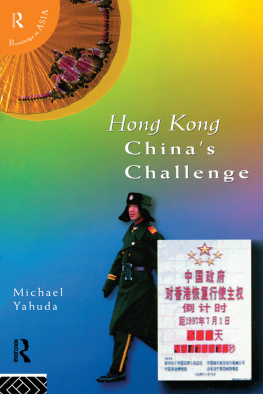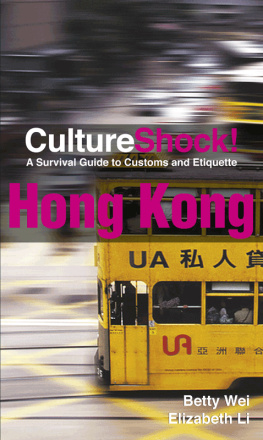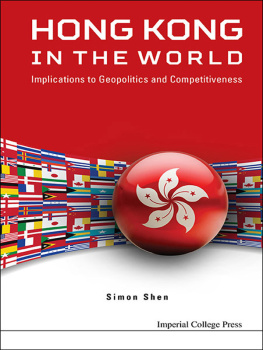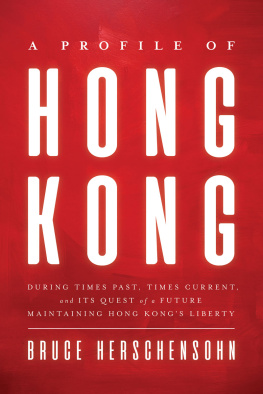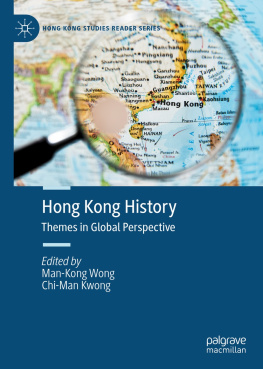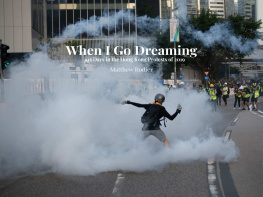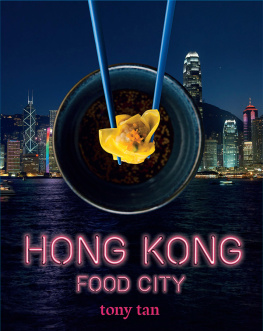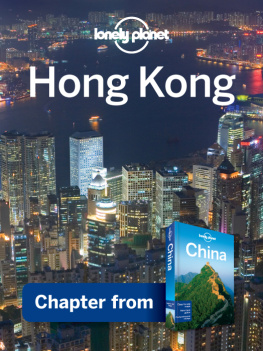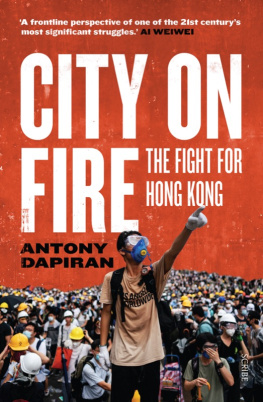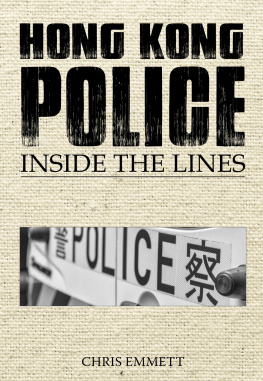SYD GOLDSMITHs first taste of Chinas Cultural Revolution is blood on his tongue. Its 1967. Hong Kong is simmering, plagued by communist-led riots and strikes, crippled transport, punishing water-rationing, takeover threats from Beijing and roadside bombs. And Sydthe only Caucasian Foreign Service Officer at the American Consulate General who speaks Cantoneseis made responsible for reporting and analysis of the Hong Kong governments ability to survive.
The CIA station chief and the head of Macaus gold syndicate play major roles in Syds story, along with Newsweeks Sydney Liu and Maynard Parker, and a steady stream of inquiring foreign correspondents and China-watchers. Richard Nixon makes a cameo appearanceto talk football with Syd since the consul general wont see himin this riveting memoir of a year when Hong Kongs borrowed time seemed about to expire early.
Syd has been a diplomat, advisor to Chinese companies, concert flutist, and university professor during his forty years in Chinese places. He lives in Taipei with Hsiu-chen and their two children.
HONG KONG ON THE BRINK
by
Syd Goldsmith
HONG KONG ON THE BRINK
ISBN 978-988-75547-2-1 (ebook)
ISBN 978-988-77927-8-9 (paperback)
2017 Syd Goldsmith
Published by Blacksmith Books
www.blacksmithbooks.com
Unit 26, 19/F, Block B, Wah Lok Industrial Centre,
3135 Shan Mei St, Fo Tan, Hong Kong
Typeset and coded by Alan Sargent
Printed in Hong Kong
First printing 2017
First ebook edition 2021
All rights reserved. No part of this book may be reproduced in any form or by any electronic means, including information storage and retrieval systems, without permission in writing from the publisher, except by a reviewer who may quote brief passages in a review. The right of Syd Goldsmith to be identified as the Author of the Work has been asserted as have his moral rights with respect to the Work.
For all who would know that I lived
Acknowledgements
Good books are not likely to be what they are without help, and that certainly is the case with this memoir, as well as with my two novels, Jade Phoenix and Two Musicians and The Wife Who Isnt. I owe a debt of deep gratitude to readers and writers who were particularly helpful as I revised the manuscript numerous times and brought it to fruition.
Neal Moore, author of two memoirs, gave a tremendous amount of support and encouragement, as did James Spencer. They commented on all my drafts during this books birthing process. Special appreciation to Genevieve Cimaz for her perspicacious and candid comments on this manuscript as well as on all my previous work. Thanks also to Patricia Averbach and Fred Zirm for their helpful suggestions, and to Alice OGrady for her thoughts on an early effort.
I particularly appreciate the readings by Ambassador Burton Levin, and Allen Whiting, colleagues and mentors during 1967s heady days. They confirmed the facts of my account of how the Hong Kong crisis was handled in the American Consulate General. Father Ron Saucci confirmed the accuracy of his role in the story. Nancy Zi amplified my understanding of the music scene in Hong Kong, so terribly important even though our musical life was all but suspended during the worst of the turmoil.
Literary agent Ken Sherman provided a readers detailed commentary on the penultimate draft. Alan Sargent brought a deep understanding of history and a keen sense of words to the final edit for publication. Thanks go to Catherine Tai for a cover design that evokes a sense of the era.
I am hard put to find words sufficient to describe my publisher. Working with Pete Spurrier of Blacksmith Books is a writers joy.
Special thanks to my wife, Chang Hsiu-chen, for her constant support as I relived a life in Hong Kong that was before her time.
CHAPTER 1:
Between Two Worlds
B Y CHINESE CULTURAL REVOLUTION standards Hong Kong was tranquil. Rampaging Red Guards were not fighting each other in the streets for dominance of chaos they didnt understand. They werent parading teachers in front of their schools in dunce caps. They werent sacking the homes of class enemies, smashing every remnant of culture they could get their hands on.
Hong Kong was refuge from all this, from the Civil War and all the upheavals wreaked upon China by Mao. For the colonials and the expats, it was the most exciting city in the world, made so by stunning geography and wealth built on the backs of dollar-a-day labor. And on the extraordinary gap between the privileged elite and everybody else.
Set against events in the Mainland, two factory disputes in the British colony were all but inconsequential to the China watchers and most everybody else. They were modest even in daily news value. I probably followed them closer than most, since I was supposed to know what was going on in Hong Kong. Although the small clusters of school kids and workers waving their Little Red Books of Mao thought at the factory gates caught my attention, it did not initially impress me as serious communist support for the aggrieved workers.
Snaking down Magazine Gap Road to Garden Road, it was impossible not to be aware of privilege. My Chevy Bel Air was a marker. If you owned a car, you were there. All those factories where workers festered and disputes were smothered by the smallest of management concessions were far away. We lived up on The Peak. No factories there. Insulation. Whats the big deal about a factory dispute?
Reeking of invulnerability, I went to my perch in the American Consulate General, confident of a bright future I had done little to earn besides passing a couple of tests. Success on the Foreign Service exams brought me to Hong Kong as a diplomat, and good fortune led me to become the Hong Kong/Macau political officer, responsible for reporting on domestic developments in the two colonies.
That afternoon of May 11, 1967 Allen Whiting called me up to the front office. Why not take a stroll around the resettlement areas and those factories so you can do a firsthand report of the atmospherics? A simple request, from the deputy chief of mission.
I wasnt too keen about that. Westerners werent known for strolls in the resettlement estates, unless they were a police officer leading a platoon of Chinese cops. The recent Steve McQueen film The Sand Pebbles brought shivers at the thought of being skinned alive by an angry Chinese mob.
My desire to please a patron who had taken me on as a protg struggled mightily with my jitters. I wasnt one to contradict my mother either. I kept my reservations to myself.
Better to take on this assignment with a Chinese companion who knew his way around. I called Sydney Liu of Newsweeks Hong Kong Bureau.
At his suggestion, we headed toward the Tung Tau Resettlement Estate, a sprawling complex of twelve-story buildings allotting twenty-four square feet of living space for each squatter that the Hong Kong government (HKG) moved from hillside shacks into housing. The estate abutted Kowloon Walled City, a lawless warren run by criminal gangs. Close by the far side of the resettlement complex was the site of the dispute, an artificial flower factory fitting tight into a dreary scene.
We walked down a main thoroughfare edging the estate buildings on one side and a concrete expanse awaiting development on the other. Dusk settled in. We took in our surroundings in whispers, with the premonition that the conversation of outsiders could be the spark that sets off an explosion.


